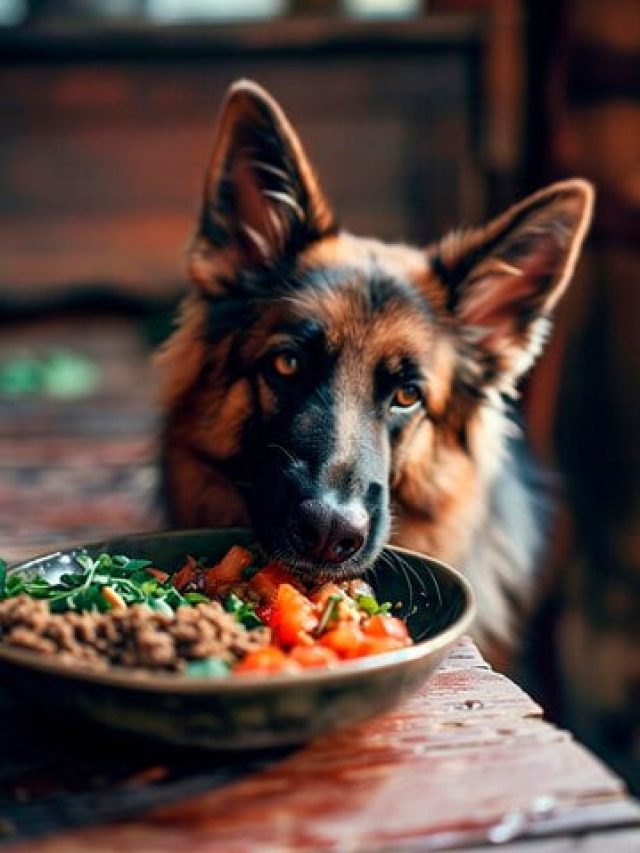This blog is here to help dog owners pick the best dog food for sensitive stomachs. We will give you practical tips and recommendations to make sure your dog stays healthy and happy.
Taking care of a dog means making sure they eat the right food. Just like people, dogs need good food to stay healthy. But sometimes, dogs have sensitive stomachs, which means certain foods can make them feel sick.
Good nutrition is super important for dogs. When dogs eat the right food, they have more energy, a shiny coat, and a strong immune system. The right food helps them stay active and happy.
Some dogs have sensitive stomachs. This means that certain foods can make them feel sick. They might throw up, have diarrhea, or get a lot of gas. It can be tough to see your dog feeling bad, so it’s important to find food that agrees with them.
Understanding Sensitive Stomachs in Dogs
What is a Sensitive Stomach?
A sensitive stomach in dogs means that their stomach gets upset easily.Certain foods can make people feel sick.
Common Symptoms
When a dog has a sensitive stomach, you might notice:
- Vomiting (throwing up)
- Diarrhea (runny poop)
- Gas (farting a lot)
- Abdominal pain (their stomach hurts)
Causes of Sensitive Stomachs
Dietary Indiscretions
Sometimes dogs eat things they shouldn’t, like table scraps or trash. This can upset their stomachs.
Food Intolerances and Allergies
Some dogs can’t handle certain ingredients in their food, like beef, dairy, or wheat. These ingredients can make them sick.
Underlying Health Conditions
Certain health problems can cause sensitive stomachs, such as:
- Inflammatory Bowel Disease (IBD)
- Pancreatitis (inflammation of the pancreas)
By understanding these causes, you can help your dog feel better by choosing the right food and avoiding things that upset their stomach.
Identifying the Right Dog Food

When your dog has a sensitive stomach, choosing the right ingredients can make a big difference.
Easily Digestible Proteins
Look for proteins that are easy for dogs to digest, such as:
- Chicken
- Turkey
- Lamb
These proteins are less likely to upset your dog’s stomach.
Carbohydrates
Some carbohydrates are gentle on your dog’s stomach. Good options include:
- Rice
- Potatoes
These can help provide energy without causing tummy troubles.
Limited Ingredient Diets (LIDs)
LIDs are dog foods made with fewer ingredients. This makes it easier to figure out what might be causing your dog’s problems. Fewer ingredients also mean there’s less chance of something upsetting their stomach.
Probiotics and Prebiotics
Probiotics are good bacteria that help keep your dog’s gut healthy. Prebiotics are foods that feed these good bacteria. Including these in your dog’s diet can improve digestion.
Ingredients to Avoid
Certain ingredients can upset your dog’s stomach, so it’s best to avoid them.
Common Allergens
Some dogs are allergic to specific foods. Common allergens include:
- Beef
- Dairy
- Wheat
These ingredients can cause reactions like vomiting and diarrhea.
Artificial Additives, Preservatives, and Fillers
Avoid dog foods with artificial colors, flavors, and preservatives. These can be hard on your dog’s stomach and are unnecessary.
High-Fat Content
Too much fat can cause digestive problems for dogs with sensitive stomachs. Seek out foods that have moderate to low fat content.
Types of Dog Food for Sensitive Stomachs
Commercial Dog Food Options
There are different types of commercial dog food that can help dogs with sensitive stomachs.
1. Dry Kibble
Dry kibble is crunchy and can help clean your dog’s teeth. Look for kibble specifically made for sensitive stomachs.
2. Wet/Canned Food
Wet food is softer and can be easier for some dogs to digest. It’s often more palatable for picky eaters.
3. Freeze-Dried and Dehydrated Options
These types of dog food can be rehydrated with water and often have fewer preservatives. They can be good options for sensitive stomachs.
Prescription Diets
Sometimes, your dog might need special food prescribed by a vet.
When to Consider Prescription Food
If your dog has serious digestive issues or specific health conditions, your vet might recommend prescription food. These diets are specially formulated to be gentle on the stomach.
Common Brands and Their Benefits
Some popular prescription dog food brands include:
- Hill’s Prescription Diet
- Royal Canin Veterinary Diet
- Purina Pro Plan Veterinary Diets
These brands offer various formulas designed to help with different digestive issues.
Homemade Dog Food
Some people prefer to make their dog’s food at home.
Pros and Cons of Homemade Diets
Pros:
- You are fully aware of what is in your dog’s food.
- You can avoid ingredients that upset your dog’s stomach.
Cons:
- It can be time-consuming to prepare.
- It’s easy to miss out on essential nutrients your dog needs.
Essential Nutrients to Include
If you decide to make your dog’s food, be sure to include:
- Protein (like chicken or turkey)
- Carbohydrates (like rice or potatoes)
- Vegetables (like carrots or peas)
- Healthy fats (like fish oil)
Top Brands and Products for Sensitive Stomachs
Here are the top brands and products for sensitive stomachs:
1. Hill’s Science Diet

Key Features and Benefits:
- Special formulas for sensitive stomachs and skin.
- Uses high-quality, easily digestible ingredients like chicken and rice.
- Includes prebiotic fiber to support gut health.
Customer Reviews and Feedback: Many dog owners report that Hill’s Science Diet helps reduce their dog’s stomach issues and improves their overall health. Dogs seem to enjoy the taste, and it helps with coat and skin conditions as well.
2. Royal Canin

Key Features and Benefits:
- Offers a variety of specialized diets, including ones for digestive health.
- Uses ingredients that are gentle on the stomach.
- Often recommended by veterinarians for dogs with specific health issues.
Customer Reviews and Feedback: Customers praise Royal Canin for its effectiveness in managing digestive problems and maintaining their dogs’ health. The food is palatable, and many dogs show improvement quickly after switching.
3. Blue Buffalo Basics

Key Features and Benefits:
- Limited ingredient diet to reduce the risk of food sensitivities.
- Uses high-quality proteins like turkey and easily digestible carbs like potatoes.
- Free from common allergens like chicken, beef, dairy, and wheat.
Customer Reviews and Feedback: Dog owners appreciate Blue Buffalo Basics for its simplicity and effectiveness in reducing stomach issues. The limited ingredients make it easier to identify what might be causing problems.
4. Purina Pro Plan Sensitive Skin & Stomach

Key Features and Benefits:
- Formulated with salmon as the main protein source, which is gentle on the stomach.
- Includes prebiotic fiber to support digestive health.
- Omega-6 fatty acids promote skin and coat health.
Customer Reviews and Feedback: Many customers find this food helps with both digestive issues and skin conditions. Dogs enjoy the taste, and owners notice improvements in their pets’ overall well-being.
Transitioning to a New Diet
Importance of a Gradual Transition
Switching your dog’s food too quickly can cause stomach upset. It’s important to make the change slowly.
Steps to Switch Dog Food
- Days 1-3: Mix 75% old food with 25% new food.
- Days 4-6: Mix 50% old food with 50% new food.
- Days 7-9: Mix 25% old food with 75% new food.
- Day 10: 100% new food.
Monitoring Your Dog’s Response
Watch your dog closely for any signs of stomach upset during the transition. If you notice vomiting, diarrhea, or other issues, slow down the transition process.
Potential Challenges and Solutions
Handling Refusal to Eat New Food
If your dog refuses to eat the new food, try mixing a small amount of their favorite treat or wet food to make it more appealing.
Addressing Mild Digestive Upsets During Transition
If your dog experiences mild digestive issues, slow down the transition and mix in more of the old food. If problems persist, consult your vet.
When to Consult a Veterinarian
Signs That Require Veterinary Attention
Persistent or Severe Symptoms:
- Vomiting
- Diarrhea
- Weight loss
Behavioral Changes:
- Lethargy (low energy)
- Loss of appetite
Diagnostic Tests and Treatments
Potential Tests:
- Blood work
- Stool analysis
- Ultrasound
Treatment Options:
- Medications
- Special diets
- Probiotics
Working with Your Vet to Create a Long-Term Plan: Your vet can help you develop a diet and care plan tailored to your dog’s specific needs.
Conclusion
Choosing the right food for dogs with sensitive stomachs is crucial for their health and happiness. It’s important to look for foods with easily digestible proteins and carbohydrates while avoiding common allergens and artificial additives.
There are many options available, including commercial, prescription, and homemade dog food. When switching your dog’s food, do it gradually to prevent stomach upset, and always monitor your dog’s response.
If you notice persistent or severe symptoms, consult your vet to develop a plan tailored to your dog’s needs. By paying attention to your dog’s unique needs and making informed choices, you can help your dog live a healthier and happier life.
Pet Related Blogs
Best Pet Insurance for Dogs in 2024
How to Choose the Right Pet For Your Lifestyle
How To Transport Pets In India
How to Choose the Right Dog Food
FAQs
What causes a sensitive stomach in dogs?
A sensitive stomach in dogs can be caused by dietary indiscretions (eating things they shouldn’t), food intolerances, allergies, and underlying health conditions like inflammatory bowel disease (IBD) or pancreatitis.
How do I know if my dog has a sensitive stomach?
Signs of a sensitive stomach in dogs include vomiting, diarrhea, gas, and abdominal pain. If your dog shows these symptoms regularly, they might have a sensitive stomach.
Can puppies have sensitive stomachs?
Yes, puppies can have sensitive stomachs too. Their digestive systems are still developing, so they can be more prone to stomach issues.
Are there specific breeds prone to sensitive stomachs?
Some breeds, like German Shepherds, Yorkshire Terriers, and Great Danes, are more prone to digestive issues. However, any dog can have a sensitive stomach regardless of breed.
How long does it take for a dog to adjust to a new food?
It usually takes about 7-10 days for a dog to adjust to a new food. Start by mixing a small amount of the new food with the old food and gradually increase the new food while decreasing the old food.
Can I feed my dog homemade food exclusively?
Yes, you can feed your dog homemade food, but it’s important to make sure the diet is balanced and includes all essential nutrients. Consulting with a vet or a pet nutritionist can help ensure your dog gets everything they need from a homemade diet.




